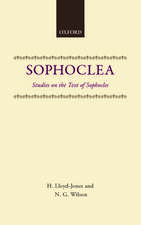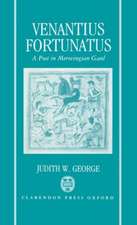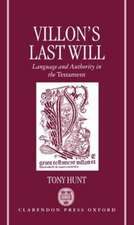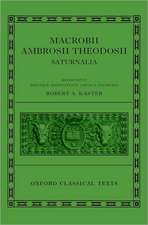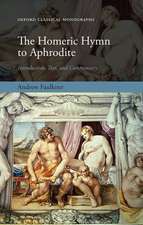Design in the Wax, The – The Structure of the Divine Comedy and Its Meaning: William and Katherine Devers Series in Dante and Medieval Italian Literature
Autor Marc Coganen Limba Engleză Hardback – 31 mar 1999
The Design in the Wax recovers the specifically medieval interpretation of the structure that underlies each part of the poem and the poem as a whole, and shows readers how to discover the single consistent principle which organizes each part and the overall narrative.
The incidents of the poem would remain hopelessly ambiguous were it not for the philosophical and theological distinctions embodied in the structure of the narrative, in whose light it is possible to reduce the ambiguity of concrete incidents to their intended allegorical content. Through medieval interpretations of Dante's sources, Marc Cogan discovers a single consistent moral and theological principle organizing each of the sections of the poem and its overall narrative. He argues that, using one common principle, Dante brings the separate allegories of the Inferno, Purgatorio, and Paradiso together into one great allegory, making the transformation of the principle into an ordered set of variations on the theme of love and its representation in human beings as the image of God. This allegory, he points out, provides a meditation on the nature of God and the capacities of human beings.
The incidents of the poem would remain hopelessly ambiguous were it not for the philosophical and theological distinctions embodied in the structure of the narrative, in whose light it is possible to reduce the ambiguity of concrete incidents to their intended allegorical content. Through medieval interpretations of Dante's sources, Marc Cogan discovers a single consistent moral and theological principle organizing each of the sections of the poem and its overall narrative. He argues that, using one common principle, Dante brings the separate allegories of the Inferno, Purgatorio, and Paradiso together into one great allegory, making the transformation of the principle into an ordered set of variations on the theme of love and its representation in human beings as the image of God. This allegory, he points out, provides a meditation on the nature of God and the capacities of human beings.
| Toate formatele și edițiile | Preț | Express |
|---|---|---|
| Paperback (1) | 363.64 lei 43-57 zile | |
| MR – University of Notre Dame Press – 31 mar 1999 | 363.64 lei 43-57 zile | |
| Hardback (1) | 701.46 lei 43-57 zile | |
| MR – University of Notre Dame Press – 31 mar 1999 | 701.46 lei 43-57 zile |
Din seria William and Katherine Devers Series in Dante and Medieval Italian Literature
-
 Preț: 213.62 lei
Preț: 213.62 lei - 15%
 Preț: 357.03 lei
Preț: 357.03 lei -
 Preț: 289.23 lei
Preț: 289.23 lei -
 Preț: 275.58 lei
Preț: 275.58 lei -
 Preț: 322.60 lei
Preț: 322.60 lei -
 Preț: 277.14 lei
Preț: 277.14 lei -
 Preț: 363.64 lei
Preț: 363.64 lei -
 Preț: 275.19 lei
Preț: 275.19 lei -
 Preț: 487.05 lei
Preț: 487.05 lei -
 Preț: 364.25 lei
Preț: 364.25 lei -
 Preț: 359.45 lei
Preț: 359.45 lei -
 Preț: 217.52 lei
Preț: 217.52 lei -
 Preț: 324.08 lei
Preț: 324.08 lei -
 Preț: 471.74 lei
Preț: 471.74 lei -
 Preț: 514.69 lei
Preț: 514.69 lei - 27%
 Preț: 707.23 lei
Preț: 707.23 lei -
 Preț: 395.97 lei
Preț: 395.97 lei -
 Preț: 511.81 lei
Preț: 511.81 lei -
 Preț: 403.04 lei
Preț: 403.04 lei -
 Preț: 474.55 lei
Preț: 474.55 lei -
 Preț: 473.56 lei
Preț: 473.56 lei -
 Preț: 397.27 lei
Preț: 397.27 lei - 27%
 Preț: 701.86 lei
Preț: 701.86 lei -
 Preț: 514.53 lei
Preț: 514.53 lei -
 Preț: 513.93 lei
Preț: 513.93 lei -
 Preț: 322.17 lei
Preț: 322.17 lei -
 Preț: 363.86 lei
Preț: 363.86 lei - 27%
 Preț: 837.25 lei
Preț: 837.25 lei
Preț: 701.46 lei
Preț vechi: 960.91 lei
-27% Nou
Puncte Express: 1052
Preț estimativ în valută:
134.24€ • 139.63$ • 110.82£
134.24€ • 139.63$ • 110.82£
Carte tipărită la comandă
Livrare economică 14-28 aprilie
Preluare comenzi: 021 569.72.76
Specificații
ISBN-13: 9780268055585
ISBN-10: 0268055580
Pagini: 420
Dimensiuni: 152 x 229 x 27 mm
Greutate: 0.79 kg
Ediția:1
Editura: MR – University of Notre Dame Press
Seria William and Katherine Devers Series in Dante and Medieval Italian Literature
ISBN-10: 0268055580
Pagini: 420
Dimensiuni: 152 x 229 x 27 mm
Greutate: 0.79 kg
Ediția:1
Editura: MR – University of Notre Dame Press
Seria William and Katherine Devers Series in Dante and Medieval Italian Literature
Recenzii
“Cogent, learned, and in some ways almost defiantly old-fashioned (as the author, in his introduction, is the first to recognize), this is an unusual and substantial contribution to Dante studies. Cogan returns to what most recent scholars have considered a long-settled, if not actually abandoned, critical issue—the ways in which the structure of the Divine Comedy helps to organize meaning—and triumphantly shows that, when one undertakes to beat a dead horse, the fruitfulness of the outcome can owe much to a careful choice of implement. Through painstakingly accurate exploration of Dante’s Aristotelian sources and detailed analysis of the poem itself, Cogan re-creates a plausible, authentically medieval understanding of Aristotle; shows how deeply this differs from the modern understanding that many readers of Dante have tried in vain to superimpose on the Comedy; and identifies the underlying moral and theological principle that links the poem’s three sections into a coherent whole. At once dense and sinuous, Cogan’s argument certainly requires careful attention from its readers—but it repays that attention in full measure.” —Choice
“[T]ightly argued and deeply learned book. . . . [I]t is one of the many strengths of Cogan’s work that questions of mere intellectual or critical fashion soon come to seem utterly trivial when set beside the importance of the inquiry he undertakes and the value of the results to which that inquiry so compellingly leads. [T]he volume...deserves to be read with careful attention by anyone seriously interested in Dante.”—Speculum: A Journal of Medieval Studies
Notă biografică
Marc Cogan is associate professor in the Department of Humanities at Wayne State University in Detroit. He is the author of The Human Thing: The Speeches and Principles of Thucydides' History.



